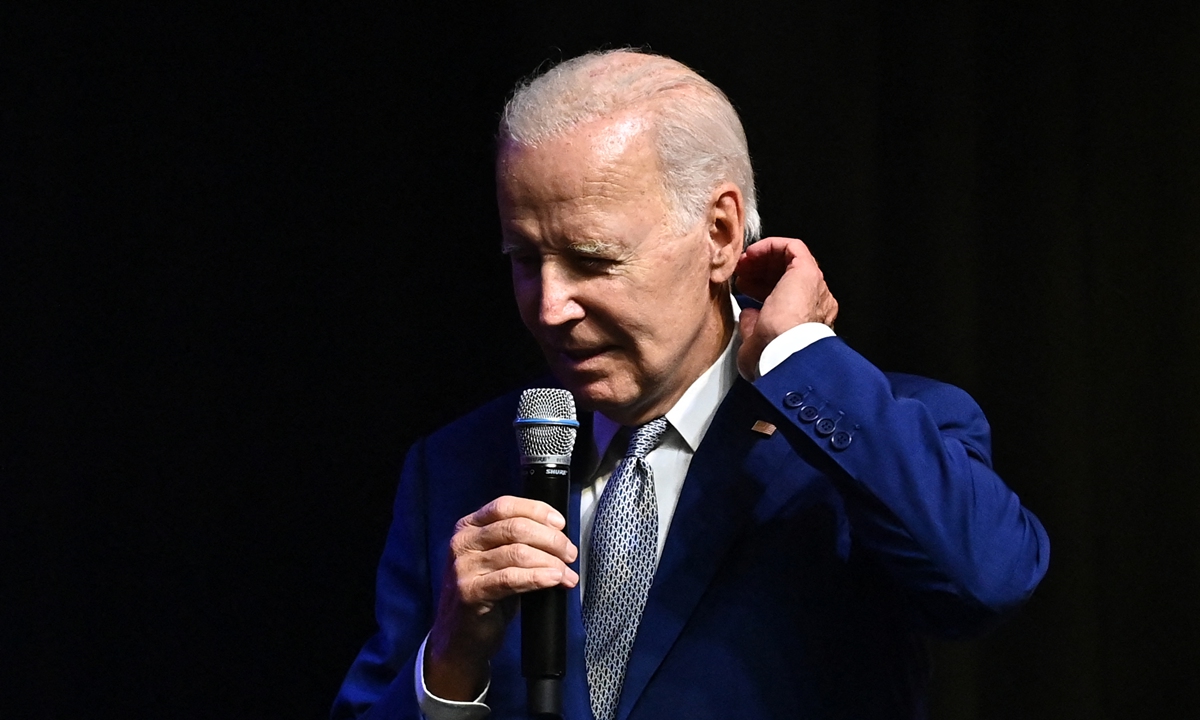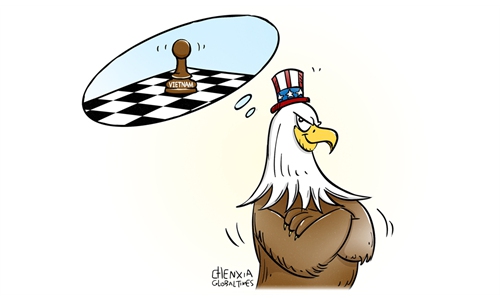China confident in Vietnam ties despite US lifting partnership
Washington ideologically different from Hanoi, while CPC-CPV ties remain solid

US President Joe Biden holds a press conference in Hanoi on September 10, 2023, on the first day of a visit in Vietnam.Photo: AFP
As the US raised its ties with Vietnam to the level of comprehensive strategic partnership, President Joe Biden continued to hide his attempt to use the relationship to "de-risk" from potential situations that might occur in the future when the US loses control over its tensions with China, and experts said on Monday that this act of "self-exposure" just makes the real intention behind Washington's developing ties with Hanoi more obvious.
Chinese analysts also said China is being calm over the development of Vietnam-US ties, as China has confidence and mutual trust in its friendly socialist neighbor. The nature of China-Vietnam ties is driven by the relationship between the Communist Party of China (CPC) and the Communist Party of Vietnam (CPV), and the US, which is hostile toward socialism, will never make its "comprehensive strategic partnership" with Vietnam reach the level of China-Vietnam relations.
When responding to a question about China's comment on US-Vietnam ties, Mao Ning, a spokesperson of the Chinese Foreign Ministry, said at a daily routine press conference on Monday that "we have noticed that Vietnam has repeatedly stressed that developing long-term, stable and sound Vietnam-China relations has always been the top priority of Vietnam's diplomacy, as well as the top priority for Vietnam's external exchanges."
China believes that the development of bilateral relations between countries should not target third parties and should not undermine regional peace, stability, and development, Mao said. "We demand that the US, when dealing with Asian countries, respect the common aspirations of regional countries for stability, cooperation, and development, abide by the basic norms of international relations, and abandon hegemony and cold war mentality," the spokesperson remarked.
Obvious intention
It's not about trying to start a "cold war" with China, Biden said at a news conference in Vietnam's capital after attending the G20 summit in India. "We're not trying to hurt China." Under his watch, Biden said the US' goal is "getting the relationship right" between the world's two foremost powers, US media reported on Monday.
But almost every US media outlet mentioned the US attempt to contain China's influence or "de-risk", in fact decouple, when they reported on Biden's visit to Vietnam. The AP said in its report that "the expanded partnership [with Vietnam] reflects a broader effort [of the US] across Asia to counter China's influence." CNN said in a report on Monday that Biden is in Vietnam for "a series of high-profile meetings aimed at countering China's influence in the developing world."
It seems like even US mainstream media don't buy what Biden said, and the remarks of the US president are just like "a poor lie that reveals the truth," as his administration is now doing almost everything it can to contain China's legitimate and rightful sci-tech development in fields like semiconductors, and forcing its allies to do the same. It is making no correction to fix China-US trade ties, which were seriously damaged by the former administration led by Donald Trump, and US military forces have carried out, or are carrying out frequent and provocative activities around China in sensitive regions like the Taiwan Straits and the Yellow Sea, analysts said.
"Let's be honest, if there were no China-US tensions, Washington wouldn't be so interested and have such strong intentions of upgrading its ties with Vietnam to this level," Lü Xiang, a US studies research fellow at the Chinese Academy of Social Sciences, told the Global Times on Monday.
Xu Liping, director of the Center for Southeast Asian Studies at the Chinese Academy of Social Sciences, told the Global Times on Monday that "when US Vice President Kamala Harris visited Vietnam in 2021, the US had already expressed its hope to upgrade the relationship, but Vietnam showed a 'wait-and-see' attitude at that time. This proves that the US is the one with a more desperate desire."
The US wants to make Vietnam a key partner in its Indo-Pacific strategy, especially when the US is trying to "de-risk" from the uncertainty caused by its tensions with China, especially in the field of rare earths and semiconductors, Xu noted.
Biden reiterated at a meeting attended by executives of top US and Vietnamese firms in the semiconductor, tech and aviation sectors on Monday that the two countries were deepening cooperation in cloud computing, semiconductors and artificial intelligence, and stressed that Vietnam was crucial for critical minerals supplies, Reuters reported.
Vietnam has the world's second-biggest estimated deposits of rare earths, which are used in electric vehicles and wind turbines, according to Reuters. Chinese analysts said the US wants to reduce its reliance on China, and make Vietnam another producer of semiconductors to "de-risk" its supply chain from China-US tensions in the future.
However, even if these US efforts can be sustainable and withstand the uncertainty of US presidential elections in 2024, these goals are very difficult and costly, and will also take a long time, Lü said, adding that "It won't see significant achievements in the short term. Just look at the case of TSMC's delayed plant construction in Arizona. Training qualified workers and building plants are not something that can be completed in a few years."
Some observers said if the US can successfully help Vietnam build a capability to produce advanced chips, based on the huge profits in the Chinese market and close ties and high-level mutual trust between China and Vietnam, it wouldn't be bad news for China, and maybe this will help China to break the containment launched by the US one day.
Hanoi's wisdom
Just a week ahead of Biden's visit to Vietnam, Liu Jianchao, head of the International Department of the CPC Central Committee, led a CPC delegation on a visit to Vietnam from September 4 to 6.
During the visit, Liu met with General Secretary of the Communist Party of Vietnam Central Committee (CPVCC) Nguyen Phu Trong, the Xinhua News Agency reported.
According to the Vietnam News Agency, during the meeting, "Highlighting the tradition of friendship and mutual assistance between the two Parties, the two countries and the two peoples, Trong expressed appreciation for the Chinese people's help for Vietnam's revolutionary cause and socialist construction and national development over the period," as well as the contributions of Chinese senior leaders, particularly Xi Jinping, general secretary of the CPC Central Committee and the president of China, "to the development of Vietnam-China relations in recent years."
During a meeting with Xi in his visit to China in June, Prime Minister of Vietnam Pham Minh Chinh said that "developing long-term, stable and sound Vietnam-China relations has always been the strategic choice and top priority of the Communist Party of Vietnam and the Vietnamese government," Xinhua reported
Although some US media trumpeted that upgrading the bilateral ties to the level of "comprehensive strategic partnership" puts Washington's engagement with Hanoi "on a par with that of Beijing's and Moscow's," they will never reach how Vietnam describes its ties with China, experts said.
Based on the high-level mutual trust between the two Parties, Vietnamese leaders have frequent engagements with China, especially when they have had, or are going to have, new interactions with the US, so China is fully calm and confident about the situation, analysts said.
The dispute over the South China Sea issue is probably the last problem to be solved between China and Vietnam, and the two sides have reached a consensus on dealing with the problem through negotiations, and even if Vietnam wants to use the US to add some leverage, Hanoi will never be fooled or used by Washington to risk its national security, especially political security, to blindly serve the US' Indo-Pacific strategy and provoke its powerful neighbor, with which it has intertwined trade ties and a shared socialist ideology, Lü noted.
A report published by the New York Times one day ahead of the Biden's visit also reminded Vietnam about the long-standing and heavy hostility against the CPV from the US. The report said "Hanoi is making clandestine plans to buy an arsenal of weapons from Russia in contravention of American sanctions, an internal Vietnamese government document shows."
The report on Saturday also said, "The Biden administration has reciprocated early, glossing over the CPV's intensifying human rights crackdown."
These harsh sentences reflected the arrogance and hegemonic nature of the US and its infamous tradition of interference in other countries' domestic affairs, and also showed the limits of US-Vietnam relations, experts said.
According to Vietnam's Ministry of Public Security, the terrorist attacks on two police stations in Dak Lak province that killed nine people were linked to "a terrorist organization based in the US," the VNA reported on June 22.
"We have arrested 65 suspects, including a member of a US-based organization that received orders from this organization to intrude into Vietnam and stage the attacks," Major General Pham Ngoc Viet, director of the Vietnam's Ministry of Public Security's Homeland Security Department, said at the high-level conference of heads of counter-terrorism agencies held by the United Nations in New York.
Chinese experts said that when seeking opportunities for development through having strategic partnerships with different major powers, the CPV and government are very clear about this: the ideological difference is the structural problem between Vietnam and Washington, and a stable and close relationship with China is key for the success of socialism in the country.


